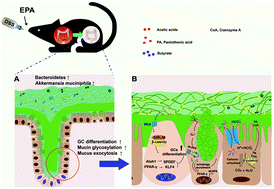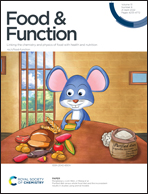EPA and DHA differentially coordinate the crosstalk between host and gut microbiota and block DSS-induced colitis in mice by a reinforced colonic mucus barrier
Abstract
Background: Ulcerative colitis (UC) is a chronic inflammatory disorder of the colon with a continuously remitting and relapsing course. Its etiology is closely related to abnormal interactions between host and gut microbiota. The mucus barrier lining the gastrointestinal tract is necessary to coordinate host and gut microbiota interaction by nourishing and modulating the microbiota. Differential effects of the anti-inflammatory fatty acids docosahexaenoic acid (DHA) and eicosapentaenoic acid (EPA) on UC progression in mice were firstly addressed by our previous work; here, the mechanism for their respective effects were further uncovered from host–microbiome crosstalk based on mucus barrier modulation to pave the way for UC therapy. Methods: Assessment of the disease activity index and histopathology score was conducted in mice with dextran sodium sulfate (DSS)-induced colitis pre-treated with different doses of EPA and DHA. Mucin generation, glycosylation and secretion were evaluated by a combination of electron microscopy, specific mucous staining, and qPCR. Western blotting was used to analyze the underlying molecular events. Fecal short chain fatty acids were detected using gas chromatography, and the gut microbial composition was analyzed using 16S rRNA sequencing. Results: Compared with DHA, the more potent inhibitory effect of high dose EPA on DSS-induced colitis was reconfirmed, which was underlain by a reinforced mucus layer as indicated by increased mucin granule release, mucus layer stratification and markedly upregulated expression of the key modulators involved in goblet cell differentiation. In turn a remarkably enhanced mucus barrier in the EPA group functioned to modulate the gut microbiome, as demonstrated by the enriched abundance of the phylum Bacteroidetes and mucin-degrading bacterium Akkermansia muciniphila producing acetic and propionic acids. Conclusions: EPA and DHA differentially coordinate the interaction between the host and the gut microbiota and relieve mucus barrier disruption in DSS-induced colitis. EPA may develop into a promising adjunctive therapy for UC.



 Please wait while we load your content...
Please wait while we load your content...